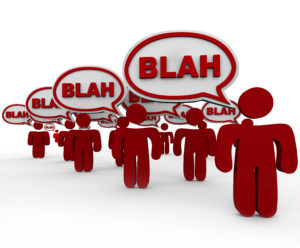 Communication is simple, right? We talk and someone else listens, or they talk and we listen. So if it’s so simple why is the outcome often different than we expected? Why do seemingly easy conversations turn into confrontations? And why do you or the other person walk away from the conversation shaking your head and wondering what it was all about? There are a host of reasons, and the primary reason is that listening is a lost art.
Communication is simple, right? We talk and someone else listens, or they talk and we listen. So if it’s so simple why is the outcome often different than we expected? Why do seemingly easy conversations turn into confrontations? And why do you or the other person walk away from the conversation shaking your head and wondering what it was all about? There are a host of reasons, and the primary reason is that listening is a lost art.
You are probably saying, Linda, come on, I listen really well. In fact, I can repeat back verbatim what the other person has said. That statement is the problem. My husband says this to me all the time when I accuse him of not listening. Indeed, he can regurgitate back to me what I just said, so in his mind he was listening. I argue though that he HEARD what I said, but wasn’t LISTENING.
What’s the difference between hearing and listening? Hearing is an auditory function. Sound comes into your ears and you hear those sounds, including words. You can’t stop the auditory function and, in fact, you can hear multiple sounds simultaneously (think TV, someone talking, and sounds in the kitchen). Listening, on the other hand, requires you to be present and put attention to more than the words.
Effective listening includes paying attention to the following:
- 1. What they are not saying. Often what someone is not saying is as important as what they are actually sharing. For example: An employee sits down to discuss a challenge they are having with completing a project. They explain not receiving information they requested from others on time and the impact on meeting the deadline. Perhaps what’s underneath this is they don’t know how to make the request and gain commitment from others. Or they are uncomfortable following up with someone. What they are saying versus what they aren’t saying can be the difference between moving the situation forward or having it stay the same.
- 2. Their emotions. Words are simply the way we express ourselves, and the power in listening is in identifying the emotions behind the words. Are they afraid, frustrated, angry, joyful…each emotion has a different way we might approach them. Emotions are powerful; ignoring them while we hear the words can have disastrous results.
- 3. The specific words they are using. Just like emotions, the specific words used can be telling. When someone says they are frustrated, fearful, or concerned they are big emotional words, so pay attention. When someone is cursing it may be their way of communicating all the time, or it may be telling. The difference between someone saying “I wish…” versus “I require” or “I demand” is huge.
- 4. Needs and values that are shared. People tell us what they need, what’s important to them, and their values without using those words. You’ll hear someone say, “I want to be able to leave by 5 PM so I can coach softball” or “Attending this training will help me…” or “I want to have upward mobility, but not if it means I have to travel…”. Each of these statements reflects a need, a value, or what’s important, and you have to be listening to recognize it.
- 5. What’s lacking. Like needs and values, without knowing it people reveal to us what’s lacking. Let’s say I’m talking to my husband about feeling like I am doing the lion’s share of managing the household. Maybe he even listens well enough to recognize my frustration. But what might be lacking is more than simply him chipping in. Maybe it’s me not feeling like he cares enough about me (I know, it’s a girl thing) or maybe I don’t think he realizes how much I am doing and what is taken care of all the time or that I have the ability to handle things I am handling.
How do you improve your listening skills?
- 1. Ask questions to clarify. Human beings do not ask enough questions. We make assumptions based on our own experience, beliefs, and values. Then we act on those assumptions. To ensure you understand, you have to ask questions. Questions such as “what do you mean by…”, “what makes this important to you…”, “what specifically do you want from me…” clarify so you actually know instead of assuming you know.
- 2. Use active listening. If there is one skill in listening to improve it’s the active listening skill. What I love about using this skill is that it doesn’t matter if you are right or wrong, you get information that will deepen your understanding, and the other person knows you are actually listening to them. If you want to know more about the active listening skill reach out to me on our contact form.
- 3. Make sure you know what they want and need. I suggest to clients when someone starts talking to ask what they want or need from them. Are they there for advice, help, support in some way, or something else? You’d be surprised how often they haven’t thought about it themselves and don’t know the answer. If they don’t know, you surely can’t. If they do know then how you listen might change.
- 4. Quit focusing on solving the problem. Adding on to bullet #3, quit focusing on solving the problem and focus on listening. They may not need you to solve the problem, but most of us rush in with advice, ideas, and ‘here’s what I think you should do’. Stop it!
Listening is so much more than hearing words. You can’t be listening, regardless of how well you think you are if you are reading emails, playing games on an electronic device, or anything else. Sure, you can hear what they are saying, but you’ll miss the clues that will help you determine what is behind the words. Don’t listen to hear, listen to understand. The greatest human need we all have is to feel like we are heard and understood. Take the time to listen, and the rewards will be amazing.
The first step to improving your communication is to find out how you are communicating now, and how people react to your communication style. In 5 minutes you can find all this out and more. Click the link below and take our communication quiz.
© Incedo Group, LLC








